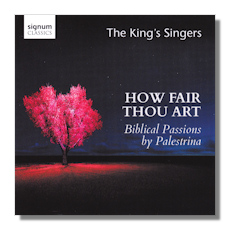
The Internet's Premier Classical Music Source
Related Links
-
Palestrina Reviews
- Latest Reviews
- More Reviews
-
By Composer
-
Collections
DVD & Blu-ray
Books
Concert Reviews
Articles/Interviews
Software
Audio
Search Amazon
Recommended Links
Site News
 CD Review
CD Review
Giovanni Pierluigi da Palestrina

How Fair Thou Art
- Alma redemptois mater
- Quam pulchri sunt gressus tui
- Pulchrae sunt genae tuae
- Tota pulchra es anima mea
- Nigra sum, sed Formosa
- Regina coeli
- Trahe me, post te
- Veni, veni, dilecte mi
- Surge, propera amica mea
- Descendi in hortum meum
- Ave regina coelorum
- Sicut lilium inter spinas
- Osculetur me
- Ecce tu pulcher es
- Sicut lilium inter spinas
- Salve Regina
The King's Singers
Signum Classics SIGCD450
Pierluigi da Palestrina (from the commune about 20 miles east of Rome and better known simply as Palestrina, of course) lived from 1525 or 1526 to 1594 working in Italy – specifically, holding a string of church appointments in Rome. Towards the end of his life, after marrying his second wife, Virginia Dormoli, and while employed once more at St. Peter's he turned his attention to the secular Canticum Canticorum (Song of Songs), the texts from the Hebrew Bible celebrating joy and human love. Popular throughout the period of Renaissance Humanism, the Song of Solomon sequence is free and exhilarating yet without indulgence or excrescence.
Palestrina's settings emphasize the aspect of the group of Canticum Canticorum which displays restraint and decorum. They were dedicated to Pope Gregory XIII – and published in 1584. Indeed, such a dedication suggests, perhaps, that the often openly erotic and sensual was to be considered "translated" towards something less personal, more widely human than sexual.
This recording of a dozen settings from the Canticum Canticorum itself is framed by four marian motets. It's entitled "How Fair Thou Art – Biblical Passions…" to convey adoration, admiration and elevation of such human experiences; and of Mary's role as worthy of Christian worship. But the singing style of The King's Singers, for all their seriousness and sensitivity, seems aimed at bringing the immediacy and fervor of the Canticum Canticorum and the motets right down to earth. The very first meticulously-articulated phrase sets the tone for the rest of the 55 minutes of close choral singing which we get from Signum here. Enunciation is emphasized. At the same time, the "soul", the energy of this music, is expected to follow the King's Singers. But it doesn't consistently do so.
Aided in part by a very forward and closely-miced recording, there is a paradoxical roughness, a readiness and a rugged approach to the words (but not the melodic lines) in their delivery which will be taken at best as "spontaneity"; less charitably as "demotic". Not quite restrained "showiness"; but neither particularly gentile or refined.
We are used to hearing Palestrina's music as "angelic", transcendant and ethereal. This set of 16 performances is at the opposite end of the spectrum. For some listeners it will be the kind of "realism" that they need as an antidote to "total" counterpoint of the prima pratica … indeed, every syllable of the King's Singers is enunciated with great clarity. The subtleties of the harmonies are all respected.
But this is very much a recording emphasizing the performance itself, and the singers who have chosen to perform, rather than one which tethers what we hear to the overall achievement of Palestrina in a much wider context. Steering a still judicious course between the delightful and delicious, it privileges pragmatism over the wandering beauty of Palestrina's essence.
It's this contrast between words picked up and fondled by the King's Singers on the one hand and an almost studied waywardness on the other which makes it hard to get a sense of beauty through dedication and wonder on Palestrina's part. Listen, for instance, to the way in which they seem as though they must push their way through the multi-syllabled substance of the Nigra sum [tr.5], rather than let it come to them of its own accord. The performers are not technically deficient. But the performance seems more concerned to advocate the fact that the singers have taken up this music and "treated" it than to present Palestrina's own remarkable anima to us.
The acoustic (St Augustine's Church, Kilburn, London) is clean and relatively unreverberant. The short booklet briefly puts the music and composer in context and contains all the texts in Latin and English with a little about the King's Singers. This is not likely to become a definitive recording of this amazing repertoire. Truthfully, it might mislead anyone new to Palestrina's great strengths. But for those who respond to care and lack of laqueur, it may perhaps work.
Copyright © 2016, Mark Sealey


















